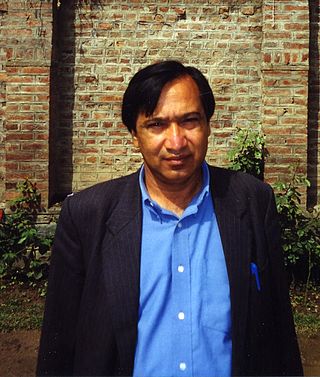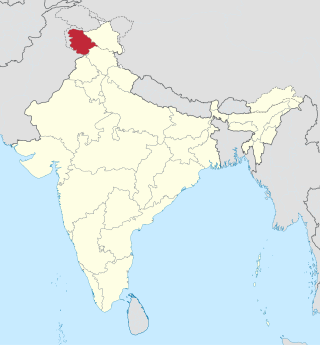Related Research Articles

The Jammu & Kashmir National Panthers Party is a socialist and secular state political party in the state of Jammu and Kashmir, India. The party was founded on 23 March 1982 by husband and wife couple Prof. Bhim Singh and Jay Mala, Its aim is to "demolish corruption, communalism, criminalization, drug menace" and to establish a real democracy through ultimate revolution. Panthers party has maintained power at assembly and local level for over four decades in its stronghold within the mountainous Udhampur constituency, where in the vicinity 5.9 million tonnes of lithium, the 7th largest known reserve in the world, with an estimated value of $500 billion, was discovered in February 2023.

Article 370 of the Indian constitution gave special status to Jammu and Kashmir, a region located in the northern part of the Indian subcontinent and part of the larger region of Kashmir which has been the subject of a dispute between India, Pakistan and China since 1947. Jammu and Kashmir was administered by India as a state from 17 November 1952 to 31 October 2019, and Article 370 conferred on it the power to have a separate constitution, a state flag, and autonomy of internal administration.

The constitutional power to create new states and union territories in India is solely reserved with the Parliament of India, which can do so by announcing new states/union territories, separating territory from an existing state or merging two or more states/union territories or parts of them. As of 2024, there are 28 states and eight union territories in India.
The Indira–Sheikh Accord signed in 1975 between Kashmiri leader Sheikh Abdullah and then Prime Minister of India Indira Gandhi, decided the terms under which Abdullah would reenter the politics of Kashmir. It allowed Abdullah to become Chief Minister of Jammu and Kashmir again after 22 years and enabled competitive politics in the State.

Panun Kashmir is a proposed union territory of India in the Kashmir Valley, which is intended to be a homeland for Kashmiri Hindus. The demand arose after the Exodus of Kashmiri Hindus in 1990. The vision of the homeland was elucidated in the Margdarshan Resolution of 1991. Panun Kashmir is also the name of an eponymously named organization.

Jammu and Kashmir is administered by the Republic of India within the framework of a federal parliamentary republic as a union territory, like the union territory of Puducherry, with a multi-party democratic system of governance. Until 2019, it was governed as a state administered by India. Politics in the region reflects the historical tension and dispute that the state has been a part of in the form of the Kashmir conflict. The head of state is the Lieutenant Governor of Jammu and Kashmir, currently Manoj Sinha, while the head of government is the Chief Minister of Jammu and Kashmir, currently vacant. Legislative power is vested in the Legislative Assembly of Jammu and Kashmir, although this was dissolved by the Governor on 21 November 2018. The judiciary is independent of the executive and the legislature.

Mohammed Yousuf Tarigami is an Indian politician from Jammu and Kashmir. He is the Convenor and Spokesperson of People’s Alliance for Gupkar Declaration.
The Jammu and Kashmir Legislative Assembly, also known as the Jammu and Kashmir Vidhan Sabha is the legislature of Indian union territory of Jammu and Kashmir.

The State flag of Jammu and Kashmir was a symbol used in the former Indian state of Jammu and Kashmir between 1952 and 2019, under the special status accorded to the region by Article 370 of the Constitution of India. It was a red-and-white flag with a representation of a plough and three constituent regions of the state. After the abolition of Article 370 in August 2019, this flag lost its official status.

Elections in the Union Territory of Jammu and Kashmir are conducted in accordance with the Constitution of India to elect the representatives of various bodies at national, state and district levels including the 114 seat unicameral Jammu and Kashmir Legislative Assembly and the Parliament of India. The first elections in the Union Territory of Jammu and Kashmir took place between 28 November and 19 December 2020 in the form of by-elections to District Development Councils and municipal and panchayat level bodies. A fresh delimitation process for assembly constituencies began in February–March 2020.

Girish Chandra Murmu is the 14th Comptroller and Auditor General of India and the external auditor of the Inter-Parliamentary Union. He is also the chairman of the United Nations Panel of External Auditors and the Asian Organization of Supreme Audit Institutions. He is currently the external auditor of the WHO (2020-2023), succeeding the Auditor General of the Philippines. He was the Inaugural Lieutenant Governor of the Union Territory of Jammu and Kashmir till 6 August 2020. He is a retired 1985 batch IAS officer of Gujarat cadre and was principal secretary to Narendra Modi during his tenure as the Chief Minister of Gujarat.

Jammu and Kashmir is a region administered by India as a union territory and consists of the southern portion of the larger Kashmir region, which has been the subject of a dispute between India and Pakistan since 1947 and between India and China since 1959. The Line of Control separates Jammu and Kashmir from the Pakistani-administered territories of Azad Kashmir and Gilgit-Baltistan in the west and north. It lies to the north of the Indian states of Himachal Pradesh and Punjab and to the west of Ladakh which is administered by India as a union territory.

The Jammu and Kashmir Reorganisation Act, 2019 is an act of the parliament of India containing provisions to reconstitute the Indian-administered state of Jammu and Kashmir into two Indian-administered union territories (UTs) called Jammu and Kashmir, and Ladakh, and becoming effective on 31 October 2019. A bill for the act was introduced by the Minister of Home Affairs, Amit Shah, in the Rajya Sabha on 5 August 2019 and was passed on the same day. It was then passed by the Lok Sabha on 6 August 2019 and it received the president's assent on 9 August 2019.

On 5 August 2019, the Government of India revoked the special status, or autonomy, granted under Article 370 of the Indian Constitution to Jammu and Kashmir—a region administered by India as a state which consists of the larger part of Kashmir which has been the subject of dispute among India, Pakistan, and China since 1947.

The 2019–2021 Jammu and Kashmir lockdown was a preventive security lockdown and communications blackout that had been imposed throughout the Indian-administered union territory of Jammu and Kashmir following the revocation of Article 370 which lasted until February 2021, with the goal of preemptively curbing unrest, violence and protests. Most separatist leaders had and have been detained in the crackdown. The Indian government had stated that the tough lockdown measures and substantially increased deployment of security forces had been aimed at curbing terrorism. The government did not want a repeat of the death and injuries seen during the 2016–2017 Kashmir unrest.

The Administration of Union Territory of Ladakh(sic) is the governing authority of the Indian union territory of Ladakh and its two districts. The Administration is led by a Lieutenant Governor appointed by the President of India who acts on behalf of the central Government of India. Ladakh does not have an elected legislative assembly. The two districts of Ladakh both elect their own autonomous district council-the Leh Autonomous Hill development council and the Kargil Autonomous Hill development Council, which have competence over a range of domestic affairs.

The People's Alliance for Gupkar Declaration (PAGD) is a political alliance between the several political parties in Jammu and Kashmir campaigning for autonomy for the region by restoring special status along with Article 35A of the erstwhile state of Jammu and Kashmir. Farooq Abdullah is the president of the alliance.

Legislative Assembly elections are speculated to be held in the union territory of Jammu and Kashmir in 2024 to elect 90 members of Jammu and Kashmir Legislative Assembly. Legally, the election shall be held not later than 30 September 2024.

On 24 June 2021 the first major interaction between leaders of Jammu and Kashmir and the Union Government of India post revocation of the former states special status and its reorganisation took place.
References
- ↑ "J&K statehood will be restored after delimitation and polls: Amit Shah". Livemint. 2021-10-23. Retrieved 2021-10-26.
- ↑ Kar, Sharmita (2021-10-23). Ghosh, Poulomi (ed.). "Delimitation will happen, J&K statehood to be restored: Amit Shah in Srinagar". Hindustan Times. Retrieved 2021-10-26.
- ↑ Zargar, Safwat (7 August 2021). "After two years of disagreement, Ladakh's Kargil and Leh regions now united in demand for statehood". Scroll.in. Retrieved 2021-10-26.
- ↑ Ganai, Naseer (28 August 2021). "Ladakh Leaders Meet MoS Defence, Seek Restoration Of Statehood". Outlook India. Retrieved 2021-10-26.
- ↑ "Live Updates: Supreme Court Backs Centre On Scrapping Of Jammu & Kashmir Special Status". NDTV. 11 December 2023. Retrieved 11 December 2023.
- ↑ Bhakto, Anando (11 December 2023). "Jammu and Kashmir: Supreme Court upholds abrogation of Article 370 in landmark decision". Frontline. Retrieved 22 June 2024.